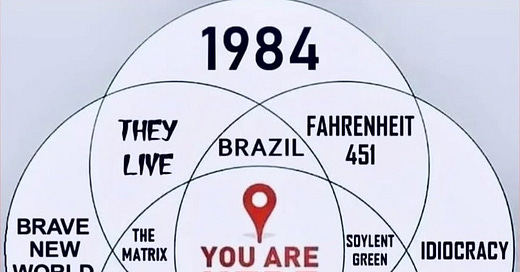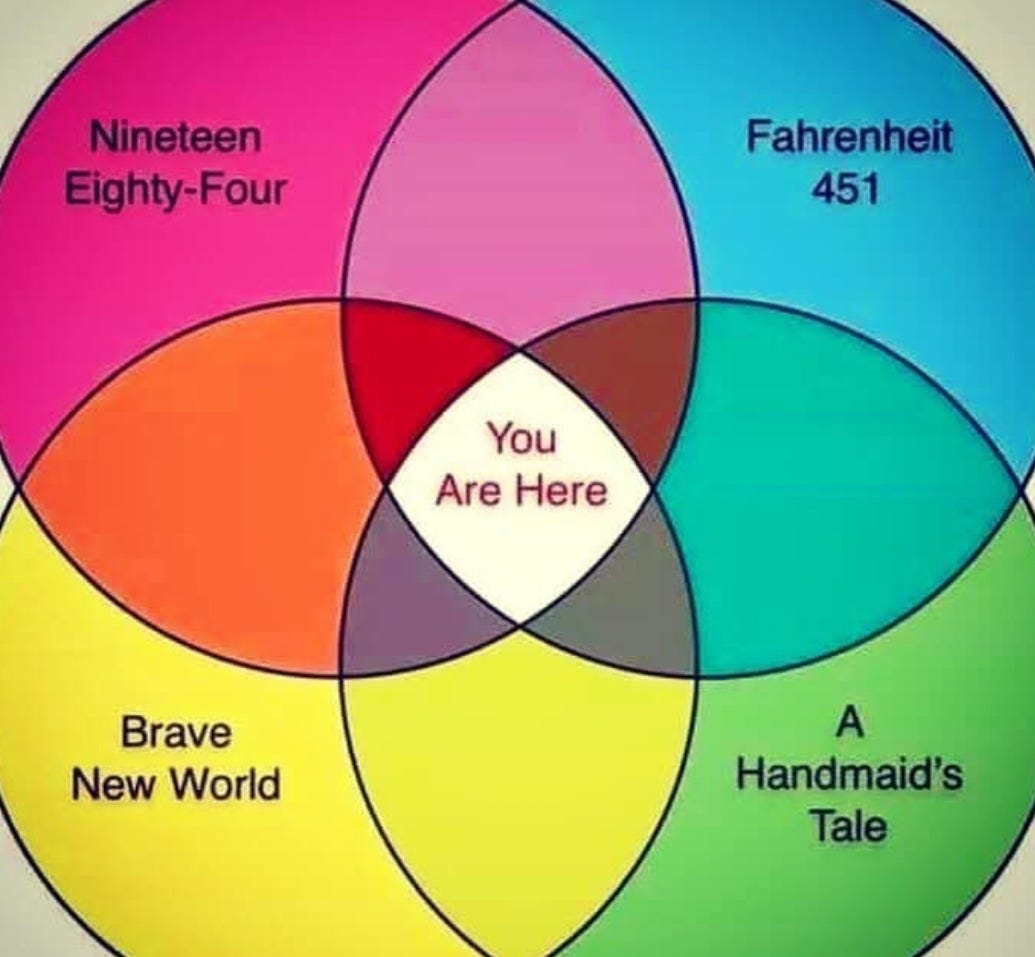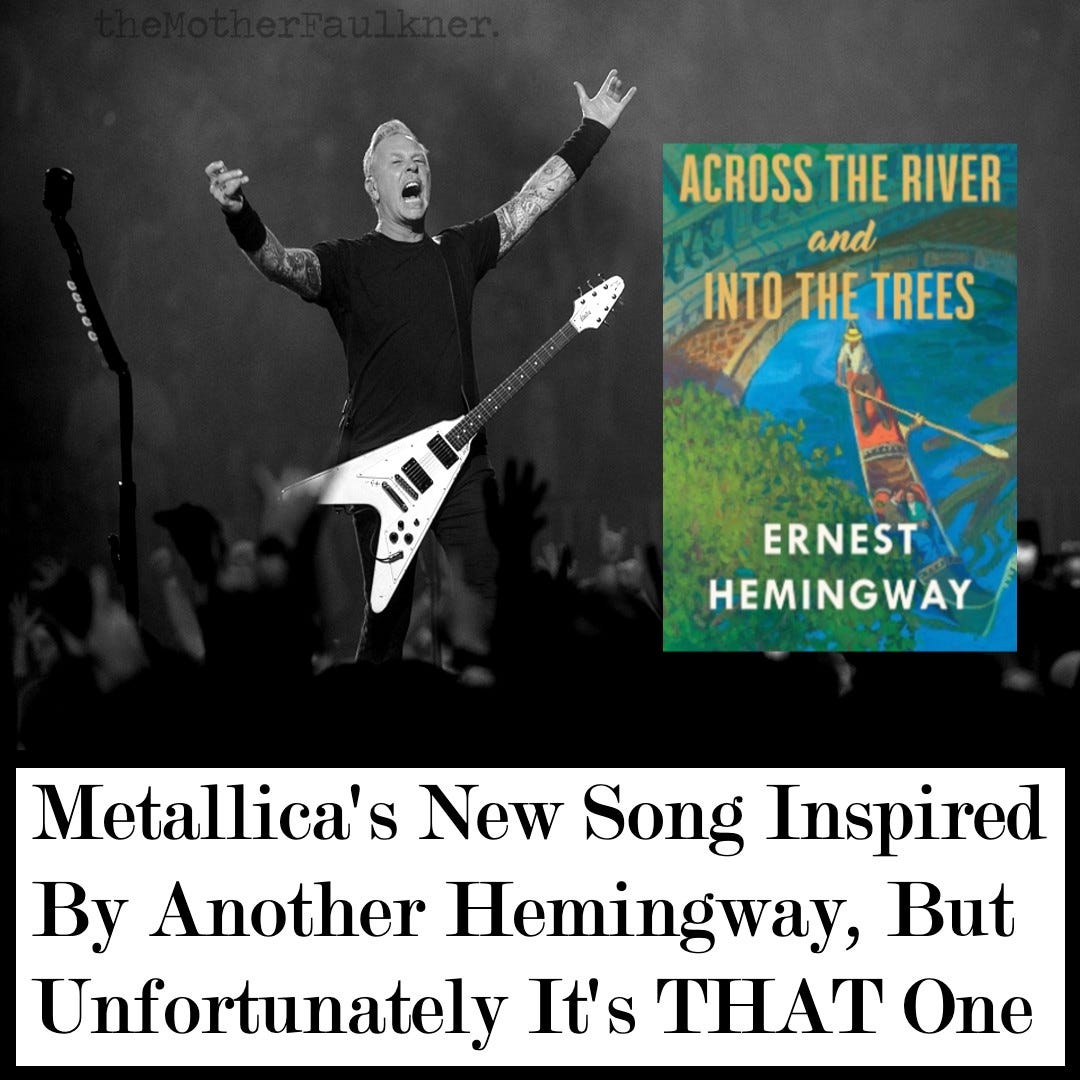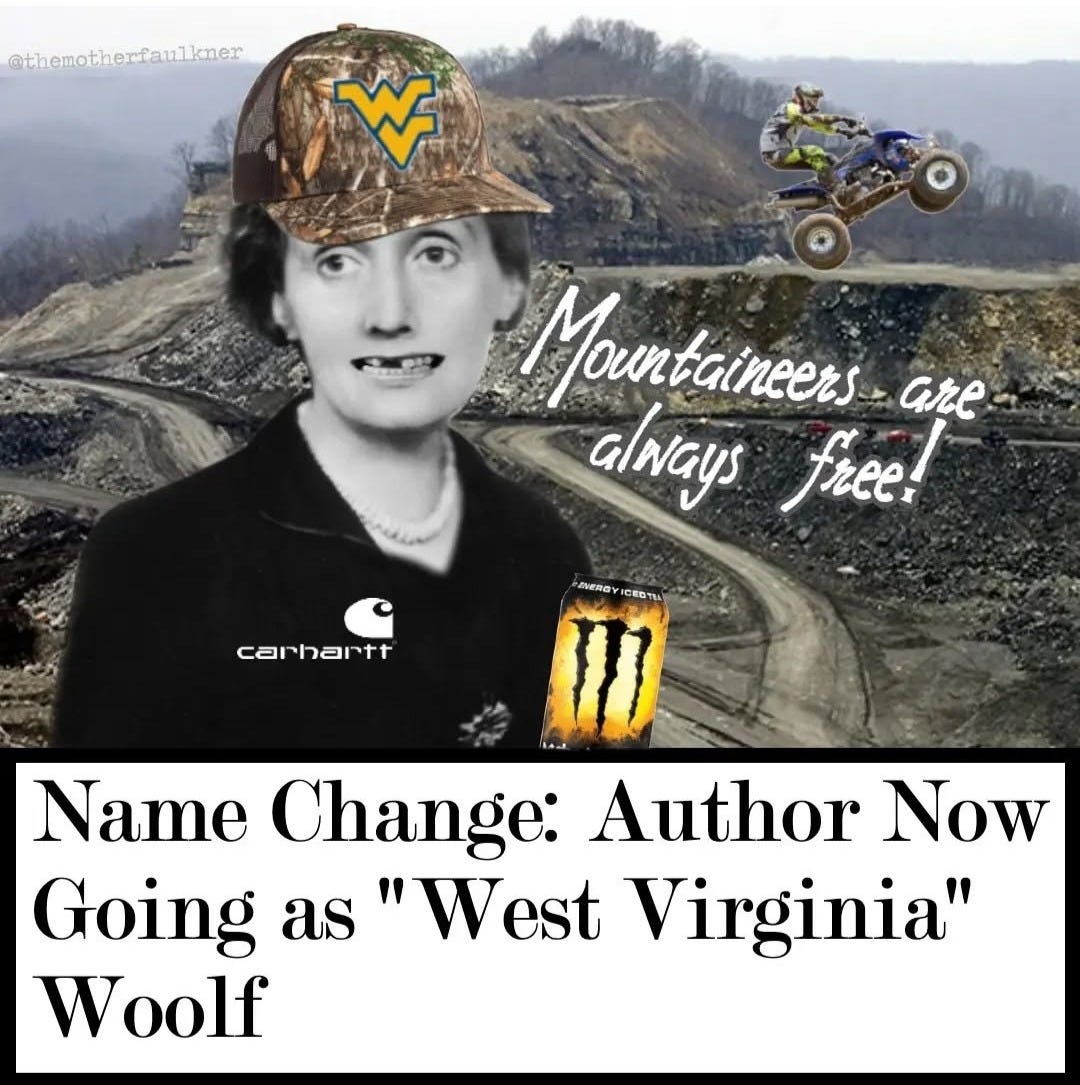Hello, reader.
There is a favorite meme of mine that has been passed around since the old days (anything before January 2025 seems like the old days to me).
When I first saw the image on Instagram, we were at the beginning of the Covid 19. We were young pups: half of us didn’t know shit about shit about “novel viruses” and the other half didn’t know our ass from our elbow concerning “pandemics.”
The meme I am addressing is a venn diagram of all of the different dystopias and how we were dead ass in the center of some very scary satirical novels and movies. There’s a couple different variations: some have scifi (Brazil, Soylent Green) and other speculative works (The Hunger Games, Animal Farm) but most of the venn diagrams I’ve seen all share four common pillar works: Fahrenheit 451, A Handmaid’s Tale, Brave New World, and 1984.
Here is one version of the diagram that I recently reshared in my Instagram story:
There’s also another version I saw which includes A Clockwork Orange, and in a minute, I’ll share why I think that belongs on this chart from a social standpoint.
Obviously, when I first shared this image in early 2020, it was more of a joke. What a great way to dump on Trump’s first term and poke fun at a very frightening possibility of a global virus outbreak.
It was a “ha-ha",” look how many novels and books share similar themes to what we are living through, and hey, aren’t I smart for being able to recognize the parallels between all of these works and our current situation. Emphasis here on look at my wonderful taste in books and movies.
The diagram is obviously a joke, meant to entertain and be shared, but overall the punchline has a layer of truth that gives us a little cold sting of reality as we laugh.
So yes, I understand that the diagram is a meme, but if I had to really examine where we actually “currently are,” I would have to outright remove a few of these titles because they are so far-fetched and ridiculous that it would not be entirely fair to even remotely claim that “you are here.”
Which, you ask? Well, you have to remove They Live, Brazil, The Matrix, The Hunger Games, Soylent Green, Mad Max, and Idiocracy for obvious reasons. It just wouldn’t be accurate to definitively say “you are here.”
However, from a satirical standpoint, each one of these works of fiction is all making timeless commentary on the nature of power, nature, evil, and humankind all in relation to one another. Each book or movie makes a point that I believe might ring true if you stretch your imagination, but give us some credit: we have not yet fully devolved as a society for us to be “here,” living in a number of those titles.
Yet, the more and more I think about it, the more and more I fear the political allusions of Idiocracy to our current state of affairs.
Yet, the more and more I think about it, the more and more I fear the political allusions of Idiocracy to our current state of affairs.
Aside from the Big Four that I mentioned earlier, that leaves us with Animal Farm, Lord of the Flies, and A Clockwork Orange and I’ll deal with each one of these separately.
First, Lord of the Flies. You are not here.
While it does not fit in with the first chunk of titles (most of them science fiction) I addressed earlier, it does have a very timely commentary on the nature of societies. It certainly has a lot to say about us: our morality, our strive for power, our delicate balance between civilization and savagery. But similar to the reason where I would have to throw out Hunger Games and Soylent Green is because I believe that we as a people would rather help than hurt our fellow man when push comes down to shove if it all goes to hell. Maybe that’s a little naive of me, but in the last few years, I’ve seen humanity come up in the clutch in certain situations that makes me believe that we are more Ralphs than Jacks.
I just don’t believe that we are yet so base that in the first signs of societal collapse we would start enslaving, killing, and eating each other. Yet.
I just don’t believe that we are yet so base that in the first signs of societal collapse we would start enslaving, killing, and eating each other. Yet.
Now then: Anthony Burgess’ novel A Clockwork Orange? You are not here.
(Remember, it’s not on the above diagram, but I’ve seen it on others). I do think that we are somewhat seeing aspects of this 1962 book come true, especially when it comes to the way society deals with psychologically disturbed adolescents who are prone to violent aggression.
Now there are huge differences between the book and movie, but ultimately both share a teen protagonist who lives in a totalitarian state yet is able to “free” himself within a subculture where sex and violence are not just fetishes, but the norm. The book has a lot to say about the way we deal with these behaviors—we are either too soft in attempting to rehab them after they have already manifested or too tough in our attempt to punish or purge those evil inclinations (see the tough-to-watch Ludovico treatment scene from Kubrick’s film adaptation for further illustration).
Now if you think Burgess’s take on “Little Johnny” (or Little Alex, in this case) is a little too extreme, remember that almost 70% of teenage boys regularly play or immerse themselves in violent video games (Pew Research). And if you think the video games themselves are bad, just wait until you hear the language they use. Alex’s use of Nadsat slang ain’t got shit on the Nazi-speak Little Johnny spews while playing these games online with his friends.
And as for pornography? According to Common Sense Media, 73% of male teens aged 13-17 have seen hardcore pornography, and 52% have intentionally viewed it.
Now I won’t try to predict that teenage boys who engage with violent video games and pornography will become ultra-violent criminals; there is no sufficient scientific evidence to support the link. However, studies have found that playing violent video games is associated with increased aggression, increased alcohol consumption, and increased behaviors that pleasure the ventral striatum (the pleasure center associated with addiction) (Violent Video Games and Crime, 2021).
So “are you here?” No, but the implications for your teenage son or future teenage son to-be-named is scary.
And as for Animal Farm? Are you here? No, you are not here.
Since Orwell’s fable is more of an allegory with an actual historical counterpart (it’s based on the inciting incident and aftermath of the Bolsheviks’ October Revolution) it is hard to say “you are here,” but more, “we were there.”
However, on a much larger scale, the novella is more of an attack on totalitarianism (an autocratic, centralized government that relies on complete subservience to the state) and those types of governments aren’t going away anytime soon. In fact, we are seeing a spike in democratic governments leaning towards a more right-wing dare I say more fascist political style that feels eerily like Napoleon the berkshire boar’s dictatorship on Manor Farm.
I won’t go as far to say that Trump’s America is anything like a totalitarian government as I sit here with an internet connection, sipping lattes, masquerading like some sort of member of the free press. However, Trump is trending away from the populism that got him elected and seems to be evolving into an “authoritarian populist” (what with the the use of hate-rhetoric, nativism, and the aggrandizing of personal power). You can read more about that in Lila Thutin’s thoughtful piece on UC Berkeley News here.
No, I don’t think Trump is a dictator like Napoleon in any way—remember, this time he won the popular vote. We the people put him here. So no, you are not “here” on Animal Farm, an animal slaving away without food or water, building windmills with no plan or purpose.
Orwell doesn’t entirely get our situation right because his tale is more a cautionary one about an unchecked dictator with no balance of legislative and judicial branches. I think in reality if worse did come to worse and Trump did try to seize absolute power, I believe the courts would hold him off long enough before someone assassinated him.
The animals in Animal Farm might have been too stupid to stage a coup, but luckily you and I are not dumb old farm animals who have never read Mockingjay, the final book of The Hunger Games.
So, this is where you are not. That is not to say you are in the clear.
So this is where you are not. That is not to say you are in the clear.
Unfortunately, saying “this is where you are not” still implies “you are somewhere.” Sadly, I believe that puts you smack dab in the middle of riiiiight here:
Stay tuned for Part 2 where I explain where you actually are and I even might tell you how the aforementioned authors explain how you can get out of this mess.
Anyways…
Our top story is about how Virginia Woolf traded her writer’s pen for a vape pen after she moved to the States and became “West Virginia” Woolf.
Also, a civil engineer is in disbelief that The House of Seven Gables offers no blueprints.
Finally, Metallica reveals plans to release a new song based off of another Hemingway book and the result is not awesome.
*Cue “For Whom the Bell Tolls”*
The audacity…
A civil engineer interested in the Turner-Ingersoll Mansion took to Nathaniel Hawthorne's 'The House of Seven Gables' to learn more about the 17th century gloomy and possibly haunted New England mansion.
But after flipping through the pages of the novel, he realized that the author failed to provide any blueprints showing the design of the actual structure.
"I see something about a side room and a mysterious attic, but I'm not entirely sure how that is architecturally feasible given the footprint of the site plan. Not only is the house poorly designed, but it might be structurally unsound."
When it was explained that the house was originally built by Matthew Maule, a convicted witch who was executed and put a curse on the house, the engineer tensely rubbed his temples.
"Without permits? Don't get me started on the code violations," he snorted.
Metallica fans were excited to hear that the metal group has another song in store based on a Hemingway book. Their song "For Whom the Bell Tolls" is a fan-favorite, appearing on the classic album "Ride the Lightning."
But when the group said the new song is based on Hemingway's widely panned "Across the River and Into the Trees," many were left head-scratching instead of head-banging.
"Interesting...this was Hemingway's worst reviewed and most self-indulgent novel," stated one blog.
"Isn't that the one where the 50 year old soldier bangs a teenager?" asked another.
The group's drummer Lars Ulrich rushed to its defense. "We were inspired by the lyric-poetical quality in the novel. Each chapter has an underlying truth presented via symbolism."
"Plus, we're a bunch of old dudes who still want to have sex with younger women," he added.
Wild and wonderful, love!
Not only has the esteemed British author relocated to "The Mountain State" but she has also legally changed her name to West Virginia Woolf!
Maybe it is the free way of life or possibly the contaminants in the water from the mine runoff, but Woolf is "all in" on her new lifestyle. She has recently taken up ATV vehicles and will also be a regular fixture at the tailgate scene of all Mountaineers home football games.
But the most surprising revelation is how she plans to give up writing altogether. What will she do to pay the bills?
"My boy Cooter got me a job driving a flatbed out in Follansbee" she spit. "Don't need a CDL or nuttin.'"









